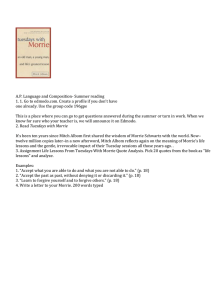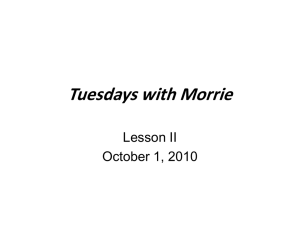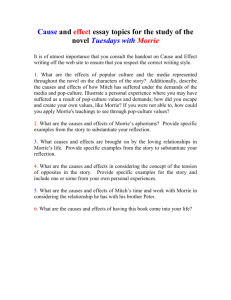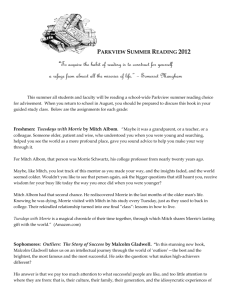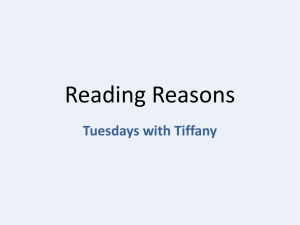Tuesdays with Morrie intro - C
advertisement
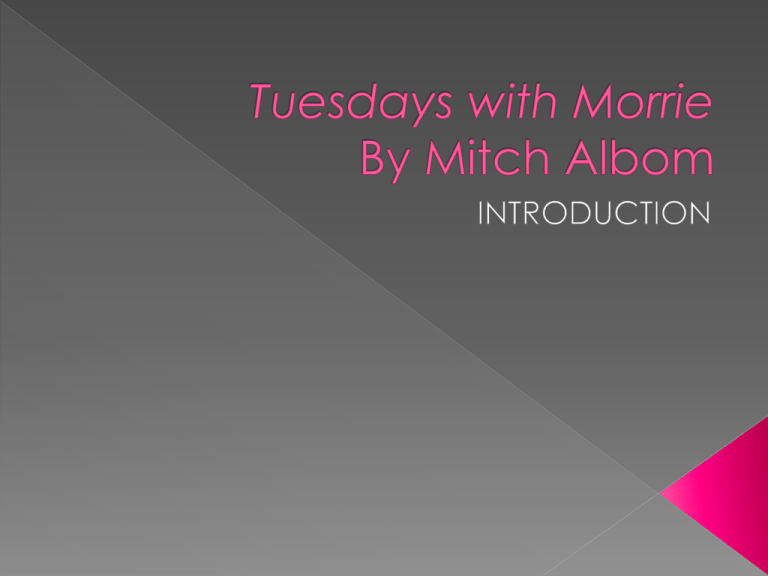
Throughout the novel Morrie will say several aphorisms. Aphorisms are defined as having some general truthful advice or being a stated observation. Using these statements found in the novel, discuss their meaning. Why are these statements more or less important? What examples from the book point this out? Once you know how to die, you know how to live. Why does silence make people so uneasy? Why do people only find comfort when they're filling the air with words? How do you spare people's feelings by denying them? Death ends a life, not a relationship. Dying is the only one thing to be sad over. Living unhappily is something else. Love wins. Love always wins. Money is not a substitute for tenderness. Invest in the human family. Invest in people. Forgive yourself. Forgive others. Don't wait. You're not a wave, you're part of the ocean What's wrong with being Number Two? Imagine there's a bird on your shoulder and every day you ask it, "Is today the day that I die? Am I ready? Am I living the life I want to live? Am I being the person I want to be? Never do work that uses, hurts or degrades people. Never make money off the sweat and pain of others. The tension of opposites. We learn from what hurts us, as much as what loves us. MITCH ALBOM (right) is a 30-somethingsports writer and graduate of Brandeis University. While he always wanted to be a jazz musician, Mitch instead leads the fastpaced life of a sports journalist, enjoying the success and adventure of being very good at what he does. MORRIE SCHWARTZ (left) is a 70-something former professor of Mitch’s, recently diagnosed with ALS. Despite the terminal nature of his condition, he insists on living out each day to its fullest instead of just dying quietly. CHARLOTTE - Morrie's caring wife, who, at his insistence, keeps her job as a professor at M.I.T. throughout Morrie's illness. JANINE - Mitch's patient wife who willingly takes a phone call from Morrie, whom she has never met, and insists upon joining Mitch on his next Tuesday visit. Although she usually does not sing upon request, she does for Morrie, and moves him to tears with her beautiful voice. PETER- Mitch's younger brother who lives in Spain. Peter flies to various European cities seeking treatment for his pancreatic cancer, though he refuses any help from his family, who he has for the most part estranged himself from. He is reluctant when Mitch first tries to reestablish a relationship with him, but eventually warms. TED KOPPEL -- One of the most famous living television interviewers, Koppel conducts three interviews with Morrie for the news show "Nightline." He is surprised when Morrie asks him personal questions just after they have met, though he immediately seems to like Morrie, andeventually grows to call him a friend. He is moved almost to tears during his last interview with Morrie, having deconstructed what Morrie had called his"narcissistic" television personality. Just what is ALS? Amyotrophic lateral sclerosis (ALS) is a progressive neurodegenerative disease that affects nerve cells in the brain and the spinal cord. Motor neurons reach from the brain to the spinal cord and from the spinal cord to the muscles throughout the body. The progressive degeneration of the motor neurons in ALS eventually lead to their death. When the motor neurons die, the ability of the brain to initiate and control muscle movement is lost. With voluntary muscle action progressively affected, patients in the later stages of the disease may become totally paralyzed. There will be quizzes over the vocabulary presented in the packet. Use the internet to define the words. One helpful website is http://www.vocabulary.com/lists/25203# view=notes Pay attention to due dates for vocabulary as well as quiz dates! There will be a lot of discussion over the book, therefore, you MUST read. We will read some chapters together and some individually. Discussions are worth points and you must speak in order to earn them/be successful. There are no formal quizzes over the book, however, you will write journal entries that will count as quiz grades. “After you have wept and grieved for your physical losses, cherish the functions and the life you have left.” “Because if you've found meaning in your life, you don't want to go back. You want to go forward.” “Dying is only one thing to be sad over... Living unhappily is something else.” “Everything that gets born dies.” “Grieve and mourn for yourself not once or twice, but again and again.” “It's not to late to... ask yourself if you really are the person you want to be, and if not,who you do want to be.” Study Guide – Will be checked periodically for accuracy and completeness and must be done in order to participate in discussion Quizzes – Vocabulary only Discussion – Worth participation points – cannot be made up due to an absence so an alternative assignment will be given in order to earn those points The Rejection of Popular Cultural Mores in Favor of Self-created Values Each of Morrie's lessons contributes to a larger, all-encompassing message that each individual, Mitch especially, should reject popular cultural values, and instead develop his own. As Morrie sees it, popular culture is a dictator under which the human community must suffer. In his own life, Morrie has fled this cultural dictatorship in favor of creating his own culture founded on love, acceptance, and open communication. He develops his own culture as a revolt against the media-driven greed, violence and superficiality which has tarnished the mores promoted by popular culture. Morrie encourages Mitch to free himself of this corrupt, dictatorial culture in favor of his own, and it is only when he does that he begins to reassess his life and rediscover fulfillment. "Love Or Perish" Morrie recites a quote by his favorite poet, W. H. Auden, to encompass one of his most important lessons to Mitch: in the absence of love, there is a void that can be filled only by loving human relationships. When love abounds, Morrie says, a person can experience no higher sense of fulfillment. Throughout his fourteen Tuesday lessons with Mitch, Morrie divulges that love is the essence of every person, and every relationship, and that to live without it, as Auden says, is to live with nothing. The importance of love in his life is especially clear to Morrie as he nears his final days, for without the meticulous care of those he loves, and who love him, he would perish. Morrie clings to life not because he is afraid of dying or because he fears what will become of him in the afterlife, but because his greatest dying wish is to share his story with Mitch so that he may share it with the world. Morrie clings just long enough to divulge the essence of his story, then releases himself to death, leaving Mitch and his audience with the message that love brings meaning to experience, and that without it, one may as well be dead. Acceptance Through Detachment In his quest to accept his impending death, Morrie consciously "detaches himself from the experience" when he suffers his violent coughing spells, all of which come loaded with the possibility of his last breath. Morrie derives his method of detachment from the Buddhist philosophy that one should not cling to things, as everything that exists is impermanent. In detaching, Morrie is able to step out of his tangible surroundings and into his own state of consciousness, namely for the sake of gaining perspective and composure in a stressful situation. Morrie does not intend to stop feeling or experiencing in his detachment, but instead, wants to experience wholly, for it is only then that he is able to let go, to detach from a life-threatening experience which renders him fearful and tense. He does not want to die feeling upset, and in these frightening moments, detaches so that he may accept the impermanence of his life and embrace his death, which he knows may come at any moment. The Media The media is continually portrayed in Tuesdays With Morrie as being inherently evil, sucking Mitch dry of his passion and ambition, and feeding the public stories of murder and hatred that have ravaged the goodness of the world's general community. Mitch, who is out of work due to a unionized strike at the Detroit newspaper he writes for, continually notices the horrific events reported by the media he for a long time has been a part of. He reads about homicides, torture, theft, and a dozen other gruesome crimes that serve to juxtapose the evil of the popular culture with the goodness of the world Morrie has created for himself. The O.J. Simpson murder trial also makes multiple appearances throughout the book, and provides Mitch with evidence to support his claim that the the general populous has become dependent on, and somewhat addicted to, media coverage of relatively meaningless stories, stories that contribute nothing to personal development or goodness as a human being. Reincarnation and Renewal Reincarnation and renewal are presented as facets of both life and death; in life, Morrie teaches that a person is ever-changing, and in death, looks forward to some form of new life with the natural progression of the life cycle. With Morrie as his mentor, Mitch is able to reincarnate himself in life, transforming a man who was once motivated by material wealth into a man who is motivated by a passion to love, and to emulate the man who has so touched his life. Morrie reveals that despite his old age, he is still changing, as every person does until their dying day. Food Each Tuesday, Mitch brings with him a bag of food from the grocery store for Morrie to enjoy, as he knows that his professor's favorite hobby, second to dancing, is eating. Morrie can no longer dance, and soon, he can no longer eat the food that Mitch brings him, either, as his health and strength have deteriorated so much, he can no longer ingest solids. The food that he brings for Morrie serves as a reminder for Mitch of the days he and his professor would eat together in the cafeteria at Brandeis, when he had been young and passionate, and Morrie energetic and in good health. Now, Mitch has been corrupted by commercial wealth, and Morrie by his illness. Although he knows that Morrie can no longer eat solids, Mitch continues to bring food each week because he so fears Morrie's fastapproaching death. The food Mitch brings him acts as a means by which to cling to Morrie and the Pink hibiscus plant As Morrie's body deteriorates, so does the condition of the hibiscus plant. The plant's pink petals wither and fall as Morrie grows increasingly dependent on his aides and on oxygen. As his death approaches, so does the death of the plant. It is continually used as a metaphor for Morrie's life and for life itself. Like the plant, humans, Morrie in particular, experience a natural life cycle, which inevitably ends in death. Morrie must accept this inevitable fate, as must Mitch. Waves on the ocean Morrie recounts a story he had heard about a small wave seeing the waves ahead of him crash on the shore, disappearing into nothingness. He suddenly brims with fear upon the realization that he too will soon 'crash on the shore' and, die as the wave fears he will. This little wave confides his fear in another wave who comforts him with the news that he will not crash and die, but will instead return to become a small part of the larger ocean. This small wave is symbolic of Morrie, as he too is on the brink of crashing into a theoretical shore, a symbolic embodiment of his death. Like the wave, Morrie is comforted by the knowledge that he will soon return to something larger in the afterlife. Morrie's affinity for the parable denotes his belief in a form of reincarnation, which he understands as intrinsic part of the natural life cycle. Morrie's bed Morrie's aphorism, "When you're in bed, you're dead," eventually comes true. Throughout Morrie's struggle with ALS, he refuses to stay in bed, as he sees it as a form of surrender, and instead opts to rest in the chair in his study. Morrie intends to live his last days as fully as he can, and knows that if he is to remain in bed, he will surrender himself biopsy: the removal and examination of tissue, cells, or fluids from the living body demise: to convey (as an estate) by will or lease insatiable: incapable of being satisfied : quenchless <had an insatiable desire for wealth> aphorism: a terse saying embodying a general truth, or astute observation, about life
